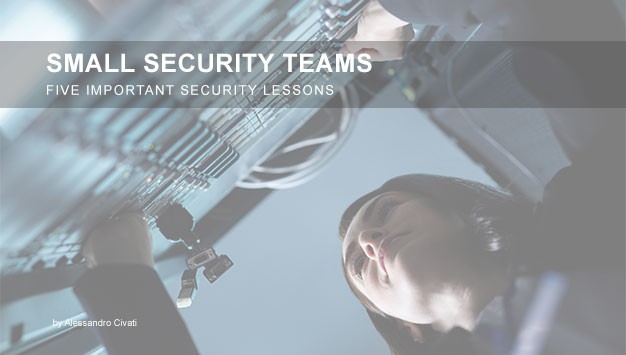Looking back to before the COVID-19 pandemic, a full-time work-from-home workforce was not fathomable. Security professionals would not even entertain the idea and talk of a remote workforce. It would have been assumed that small and medium businesses and large corporations are taking on high-risk levels. In this, there are five important security lessons for small security teams.
Small businesses are not spared from cyber-attacks. The mindset that threat actors may not have anything to do with small companies is totally out of place. Whereas large organizations have massive amounts of data to steal, small businesses lack robust security systems to protect data and prevent attacks.
Following the onset of the COVID-19 pandemic, businesses worldwide were compelled to face the new reality by adopting remote work. Due to the health recommendations that called for social distancing and wearing masks to prevent coronavirus transmission, entire workforces were forced to stay and work from home.
Within not more than 3 weeks, businesses had been compelled to place entire workforces under remote work. That means that the 3-year long-planned digital transformation strategy for many organizations was drastically cut short as companies moved fast to prevent significant disruptions due to the pandemic. Offices were quickly abandoned as governments enforced restrictions and people started working from home. Servers are left operating in offices, but the chairs were empty.
Remote work presented its own challenges as businesses scrambled to facilitate a seamless transition and grappled with massive cyber-attack surfaces. Cybersecurity challenges increased exponentially, and security teams were severely strained as they tried to respond and protect critical infrastructure and data.
However, it is hoped that the world will return to its pre-COVID state.
Increasing evidence indicates that work dynamics have been disrupted and changed forever. It is most likely that we’ll have a hybrid work environment after the whole COVID-19 situation has ended. Companies have slowly realized that it will no longer be feasible to require all their employees to report to their offices daily. A digital transformation has taken place, and the remote work situation is here to stay. How should businesses prepare for the new hybrid work dynamic? Their small security teams will have to revise security strategies, planning, and execution to address many security challenges daily.
The following are practical insights and recommendations that will help small and medium-sized businesses to prepare for the new reality. Read five important security lessons for small security teams.
- Accept that you can’t do it all: One practical way of virtually extending a small business’s security team is asking your security vendor for offered services. You will be surprised to learn about a wide range of complementary services provided alongside their paid offerings. It is an opportunity that many small businesses forego mainly for not asking but can be harnessed to effectively offer enhanced security for remote and in-house workforces.
- Response Speed is Critical: Automation of security services is a step in the right direction for security teams in small and medium-sized businesses. Speed in responding to security incidents and challenges is actually the name of the game. Rapid response has been shown to drive down the cost of a data breach. Numerous factors can affect response speed after a cyber-attack, including the size and maturity of an organization, the presence, and effectiveness of employee education programs, total headcount, and the processes, people, and technology that you have in place. Response speeds are all about identifying threats, applying fixes, and restoring regular service. Automation helps to significantly cut down on the number of threats as well as prevent unexpected threats. It reduces the number of resources, both financial and human resources, that are spent fighting off cyber threats. Cybersecurity is effectively enhanced when automation is paired with the right tools to provide impregnable protection of a business’s data and assets. Data must be analyzed to identify suspicious activity that may point to the presence of a threat within a network. Automation makes it possible to operate at speed and take proactive steps towards enhancing cybersecurity. With cyber attackers embracing automation to mount attacks with lightning speed, businesses cannot be stuck at manual interventions. Automation allows companies to be faster in response and stay a step ahead of threat actors. Besides protection, automation helps in the prevention of similar attacks in the future.
- Best Practices for Numerous Corporate Devices issued to Employees: The new reality of a hybrid work system will mean that more and more corporate devices are issued to employees to facilitate remote work. The security team must consider creating and training employees on the best practices concerning securing and managing all these devices. Best practices will also apply to the security team itself since they will also be working remotely.
- Increasing Supply Chain Attacks: Think about it; your supplier’s security is your security concern due to the intertwined nature of today’s supply chains. The security teams in small businesses must still work even with constrained budgets to identify threats currently in their environment and how they can be addressed to avoid posing a challenge to systems paired with it.
- Economies and Threat Landscapes Are Changing Rapidly: Most notably, ransomware is growing to astronomical amounts. Business must always safeguard their data and critical infrastructure from being breached or attacked. The best way to protect a business is by instituting measures across the board, from training to deploying technologies that best protect data and other assets.
These five important security lessons for small security teams will be helpful.
In conclusion, small security teams have addressed a wide range of challenges. The situation has further been compounded by the pandemic and the transitions to remote work and other hybrid work environments. The above measures will help keep the business going despite security teams having their hands complete and operating on a budget and human resource constraints.

Author: Alessandro Civati
Email: author.ac@bitstone.net
Blockchain ID: https://lrx.is/BrcEDNsW19

